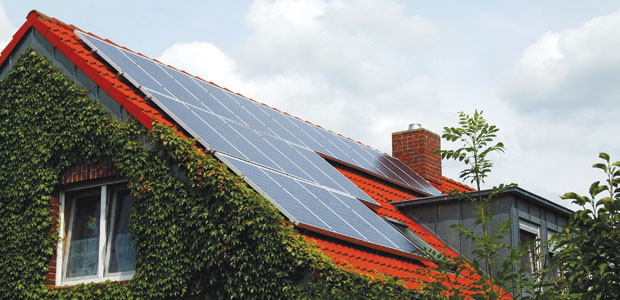Advertisement
Let the Sun Shine In
The new age of solar energy

Freiburg, Germany, has a lot to show us. Not only are its schools, central train station, hospital, and national soccer stadium equipped with solar panels but many private homes also use solar energy.
Even more impressive, the energy created by these solar panels feeds into the city’s electrical grid, adding electricity whenever extra is generated. A well-known European eco-city, Freiburg lies on the same latitude as Vancouver, BC.
Solar Sense
Solar energy provides heat and electricity without affecting air quality or creating greenhouse gases. Once installed, solar energy is free, reliable, and needs little maintenance. Its affordability increases as gas prices soar, and many home-owners are considering solar energy as a practical way to reduce their home heating bills. Heating pools with solar energy is particularly cost effective.
Solar Heat
According to the Solar Energy Society of Canada, 50 to 60 percent or more of our hot water heat could be derived from solar power. For the average homeowner, solar hot water heating is fairly simple to install, is affordable, and brings in the quickest returns. Solar panels are fixed in place on a south-facing roof to catch the sun’s rays, ideally at 15 degrees above the existing latitude.
The design usually includes panels to collect and absorb the radiation, a cover that traps the gathering heat, and tubes to take the heat to where it is needed (a pool or house) or into storage (usually a water tank).
Passive solar heating systems are simpler by design and less expensive than active systems because they use physics rather than pumps or fans (used in active heating systems) to take the heat where it is needed. Ideally, solar heating devices can be combined with heavy insulation and careful placement of windows to reduce heat loss.
Solar Basics
Solar collectors should be installed in a location that gets at least four full hours of direct sunlight per day; shade from nearby trees or buildings will interfere with collection. While solar collectors still work on cloudy days, the variable nature of cloud cover will produce somewhat unpredictable degrees of energy. For this reason, solar energy is best paired with conventional utilities for more regular service.
Solar energy is the ideal source of renewable energy in many ways. It is quiet, remarkably long lasting, efficient, and can be added to existing roofs. It is also free once installed, uses simple technology, and is affordable for homeowners. Better still, no government or industry can ration it, sell it, or take it away.
Canada Sees the Light
The Intergovernmental Panel on Climate Change held in Paris in February 2007 declared that the greatest source of global warming lies in human hands. In response, the Canadian government launched its EcoENERGY for Renewable Heat Program.
This program provides incentives to “industrial, commercial, and institutional purchasers of solar heating systems, set at 25 percent of the purchase and installation cost of the system.”
–Source: Natural Resources Canada
Solar Energy Around the World
- China: over 32 million metres squared (m2) of solar collectors
- Europe: reported 14 million m2 (2004) of solar collectors with target of 100 million m2 by 2010
- Spain: policy (since 2004) dictates each new home must install solar collectors
- Vancouver, BC, Canada: in 2003 Vancouver International Airport installed 100 solar collectors for hot water, resulting in a yearly savings of about $90,000
Solar Hot Water Heat Makes Sense
- Current solar technology lasts 20 to 40 years, is virtually maintenance-free, and pays for itself many times over.
- The sun’s energy will never–in practical terms–run out; it cannot be bought, sold, or rationed.
- Financial incentives exist federally and provincially.
- Solar energy doesn’t compromise air quality.
- No greenhouse gases, the main source of climate change, are created.
- Completely safe, solar power cannot spill or leak contaminants.
- Most homes can be converted to solar relatively easily.




